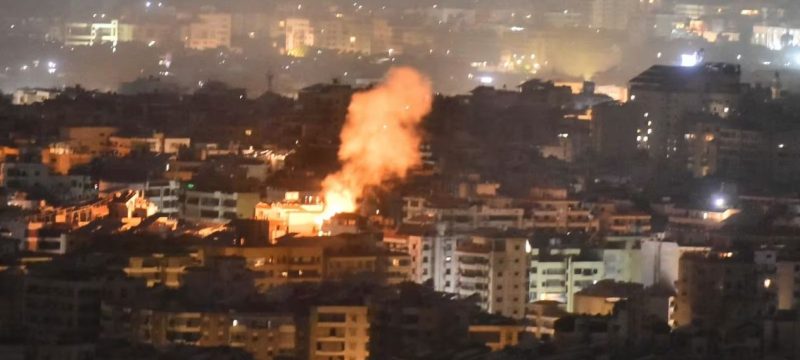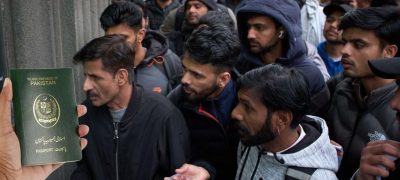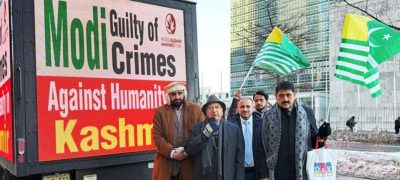Israel’s anticipated ground invasion of Lebanon began early Tuesday, as the military announced it had initiated “limited” raids targeting Hezbollah positions near the border.
In a statement, the military described the operations as “limited, localized, and targeted ground raids” based on precise intelligence against Hezbollah in southern Lebanese villages that posed an “immediate threat” to Israeli communities in northern Israel. Ground forces were supported by air and artillery strikes.
Read more: Hezbollah and Israel Trade Fire as Truce Efforts Collapse
Residents of the Lebanese border town of Aita al-Shaab reported heavy shelling, along with the sounds of helicopters and drones overhead. Flares were launched over Rmeish, illuminating the night sky.
Israeli Defense Minister Yoav Gallant had indicated on Monday that the next phase of the conflict along the southern border of Lebanon would commence soon, aimed at protecting Israelis who have fled due to Hezbollah rockets during nearly a year of hostilities.
This ground invasion marks an escalation in the ongoing Middle Eastern conflict between Israel and Iran-backed militants, which intensified after an attack on Israel by the Palestinian militant group Hamas on October 7, 2023, potentially drawing in the U.S. and Iran.
An Israeli strike early Tuesday targeted Mounir Maqdah, the commander of the Lebanese branch of the Palestinian Fatah movement’s military wing, the Al-Aqsa Martyrs Brigade, according to two Palestinian security officials. His status remains unclear.
The strike hit a building in the Ain al-Hilweh Palestinian refugee camp, the largest in Lebanon, marking the first assault on the camp since cross-border tensions with Hezbollah erupted nearly a year ago.
In Syria, three civilians were killed, and nine others injured in an Israeli airstrike on Damascus, according to Syrian state media. Israel’s military typically does not comment on foreign media reports.
Israel has conducted strikes against Iran-linked targets in Syria for years but has increased operations since the Hamas attack on October 7, which resulted in the deaths of 1,200 Israelis and the taking of approximately 250 hostages. In retaliation, Israel launched a massive offensive against Hamas in Gaza, devastating much of the territory, displacing around 2.3 million people, and resulting in over 41,300 Palestinian deaths, according to the Gaza health ministry.
Strikes on Beirut:
Israel’s ground invasion of Lebanon follows its recent deadly tactics, including detonating booby-trapped Hezbollah pagers, two weeks of airstrikes, and the assassination of Hezbollah leader Hassan Nasrallah on Friday, which has significantly weakened the group.
The extensive airstrikes have targeted several Hezbollah commanders but have also resulted in around 1,000 civilian deaths and displaced one million people, according to the Lebanese government. Overnight strikes hit the southern suburbs of Beirut, with a Reuters reporter witnessing flashes of light and loud explosions after the Israeli military warned residents to evacuate from areas housing Hezbollah infrastructure near the Lebanese capital.
In the last 24 hours, at least 95 people have been killed and 172 injured due to Israeli strikes in southern Lebanon, the eastern Bekaa Valley, and Beirut, as reported by Lebanon’s health ministry early Tuesday. Hezbollah’s deputy leader, Naim Qassem, made his first public appearance since Nasrallah’s death on Monday, stating that “the resistance forces are prepared for ground engagement.” He noted that Hezbollah continues to launch rockets as far as 150 km (93 miles) into Israeli territory, asserting that “we know the battle may be lengthy, but we will prevail as we did during the liberation of 2006,” referencing their previous conflict.
On Monday night, Lebanese troops reportedly withdrew about five kilometers (three miles) from their positions along the southern border with Israel, although a Lebanese army spokesperson did not confirm this movement. Traditionally, Lebanon’s army has refrained from engaging in major conflicts with Israel and has not fired upon Israeli forces during the past year of hostilities.
The White House and the U.S. State Department did not respond immediately to inquiries regarding Israel’s ground operations in Lebanon. However, President Joe Biden had called for a ceasefire on Monday, expressing concern over the situation. “I’m more worried than you might know, and I support them stopping,” Biden stated when asked about Israel’s cross-border incursion plans. He advocated for an immediate ceasefire.
Last week, Israel rejected a U.S. and French proposal for a 21-day ceasefire along the Lebanon border, which aimed to facilitate a diplomatic resolution that would enable displaced civilians from both sides to return home.









